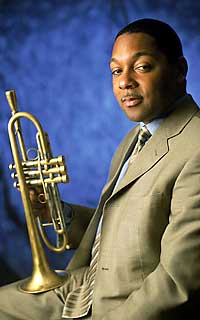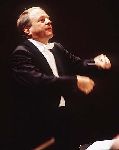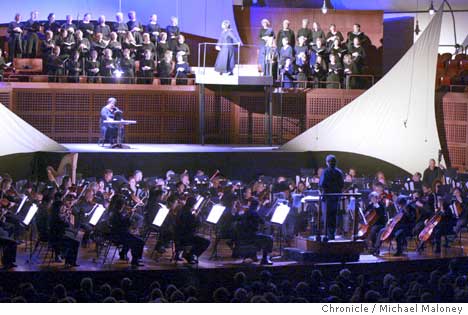2002-2003 Season
Since it worked reasonably well last year, I'm going to continue with
putting the entire season on one web page. Part of the reason is that
as this is my fourth year with the chorus, it's becoming more routine
and less novel, so I don't have as much to say about the day-to-day
life in the chorus. Also, having a web page for each concert would
quickly grow untenable. But I do want to keep some record of what
I've been doing in the chorus, so I'll list the concerts of this
season in chronological order, and update it after each concert.
Britten War Requiem (10/02)
One of the great pieces of twentieth-century music, the Britten War
Requiem was written for the 1962 re-opening of Coventry Cathedral,
which had been demolished in the Blitz of WWII. It is an interesting
piece structurally, with a large orchestra and chorus and solo soprano
performing a modern musical setting of the standard Requiem text.
Interspersed within each movement, though, are solos for tenor and
baritone, accompanied by a chamber orchestra, singing devastating
poems written by Wilfred
Owen, a soldier who fought in WWI and died in the last days of
that war. The poems range from describing deaths without any
"mourning save the choirs, the shrill, demented choirs of wailing
shells", to the story of two souls meeting in death after having
killed each other in war, or a re-telling of the Biblical story of
Abraham where, instead of sacrificing the miraculously provided ram,
"the old man would not so, and slew his son, and half the seed of
Europe, one by one." Harsh stuff.
The performance was made personal by Kurt Masur, the conductor
emeritus of the New York Philharmonic, who had fought in WWII as a
17-year-old German recruit. He made the music mean something by
alluding to his own experiences in the war. Masur is also famous for
having helped prevent violence when the Berlin Wall came down, as the
conductor in Leipzig at the time. This music meant a lot to him, and
I think some of that urgency transferred to the chorus, which led to a
better performance by all.
On a more humorous note, Masur uttered some great quotes in rehearsal.
- To the timpanist in a violent section: "It sounds too harmless.
Kill someone! Kill the conductor!!"
- To the altos: "It sounds like second sopranos. I want to feel the
lower half of your bodies."
- "This is an exciting piece if you don't make it a lullaby."
He later paid us quite a compliment by telling our conductor that
"This chorus doesn't sing, it prays." A nice image, and one supported
by the very complimentary reviews that the chorus got after this
performance.
Reviews:
Wynton Marsalis All Rise (11/02)
 Wynton Marsalis is one of
the best-known jazz musicians of our time. He has even won a Pulitzer
Prize for his oratorio, Blood on the Fields. Several years ago, Kurt
Masur, conductor of the New York Philharmonic at the time (and who
conducted us earlier this year in the Britten),
asked Wynton to consider writing a piece for symphony as well as jazz
orchestra. All Rise is the result, encompassing chorus as well. For
this performance, Wynton brought the Lincoln Center Jazz
Orchestra (LCJO) along, to combine with the San Francisco Symphony
and Chorus.
Wynton Marsalis is one of
the best-known jazz musicians of our time. He has even won a Pulitzer
Prize for his oratorio, Blood on the Fields. Several years ago, Kurt
Masur, conductor of the New York Philharmonic at the time (and who
conducted us earlier this year in the Britten),
asked Wynton to consider writing a piece for symphony as well as jazz
orchestra. All Rise is the result, encompassing chorus as well. For
this performance, Wynton brought the Lincoln Center Jazz
Orchestra (LCJO) along, to combine with the San Francisco Symphony
and Chorus.
All Rise is an interesting piece. I'll quote Wynton from the program
notes: "All Rise is structured in the form of the Blues, twelve
movements to the twelve bars. It is separated into three sections of
four movements; each section presents different attitudes about the
uncontrollable rush of experiences in the quest for happiness. The
first four movements are joyous, the second four are more somber and
poignant, and movements 9, 10, and 11 are dance movements. Movement 12
is the gospel 6/8 shuffle; a dance, but not in a secular sense."
There's lots of wonderful little musical moments in the piece. In
Cried, Shouted, then Sung, Wynton depicts a New Orleans funeral,
complete with a tuba solo playing the role of the preacher. I also
particularly enjoyed El "Gran" Baile de la Reina, with its tango
underpinnings, Expressbrown Local with the creative imitations of a
rolling train, and Saturday Night Slow Drag, which gave each member of
the LCJO a quick solo chance to express a slow night.
The performances got better each night, as the members of the symphony
and the chorus loosened up and got to know the piece better, and felt
more comfortable working with the LCJO. And the encores were incredible.
Wynton was so nice, too. Each night, there's a little solo that he
wrote for the symphony trumpet players, and each night, he'd
nod and smile and give a thumbs-up to them. One evening, a mom asked
him if he'd take a picture with her son, and he agreed to the cheers
of the audience. And, on the last night, he patiently stood and
signed the programs and music of a bunch of us choristers,
personalizing each one. Super nice.
Reviews:
Handel Messiah (12/02)
Doing the Messiah is a lot of fun. It's a great piece, and since most
of the folks in the chorus have done the piece so many times, we can
do what Vance calls an "add hot water and serve" performance, where we
have a couple rehearsals and get to it. This year's performance was
conducted by Christopher Seaman. Not much to say beyond that, except
for one amusing incident.
Bruckner Helgoland/Trosterin Musik (1/03)
The second half of this program was Bruckner's
Symphony No. 7, so MTT chose to use two short Bruckner pieces for
men's chorus, Helgoland and Trosterin Musik. Helgoland is a pretty
silly piece, telling a legendary story of how the denizens of this
tiny North Sea island fought off the Roman invaders. As the program
notes state, "Through this conflict-ridden history, Helgoland grew
into a near-mythic symbol of Germanic nationalism and a lightning rod
for artistic expressions extolling nationalist defiance." It
basically ends up being a pep rally piece, with the men of the chorus
shouting praise to Helgoland and the Allfather.
Trosterin Musik was a piece for men's chorus and organ with some nice
harmonies. Not much more to say than that.
Since we were on and off the stage in 20 minutes, there really wasn't
a lot to say about this concert. The Chronicle review was mostly
noteworthy for being the only negative review I remember us receiving
in my time in the chorus, with Joshua Kosman commenting that we had
presented "uncharacteristically slovenly renditions".
Bach Cantata No. 12/Schubert Mass No. 5 (3/03)
 Bruno Weil, the conductor of the Carmel Bach Festival, made his San
Francisco Symphony debut with this
set of concerts. He was very expressive - he was able to convey his
interpretation and his joy in the music to us.
Bruno Weil, the conductor of the Carmel Bach Festival, made his San
Francisco Symphony debut with this
set of concerts. He was very expressive - he was able to convey his
interpretation and his joy in the music to us.
The Bach was gorgeous, as always. Every time I do Bach, I'm reminded
of just how amazing his ability to weave melodies together is. It
always just feels so right. Great stuff.
The Schubert was interesting as well. It's a fairly large piece (45
minutes, 140 singers or so, full orchestra, 4 soloists) but it's got
moments of pure intimacy as well. And the chorus really gets to shine
in the piece - we're in every movement and we get to demonstrate our
dynamic range in a variety of emotions and affects. It's a nice
showpiece for our abilities, and the reviews reflected that.
Reviews:
Wagner The Flying Dutchman (6/03)
 It's big, it's long (2 hours 40 minutes), it's loud, it's Wagner.
This was a semistaged performance, meaning that the soloists run
around the stage singing of their intrigues and romance, but the
chorus mostly stays in one place. We don't have much to do in this
one - about 15 minutes of singing for the men, maybe 30 for the women.
But the soloists were excellent. Mark Delevan in the title role was
phenomenal, and Jane Eaglen as Senta demonstrated why she is acclaimed
as one of the premiere Wagnerian sopranos in the world.
It's big, it's long (2 hours 40 minutes), it's loud, it's Wagner.
This was a semistaged performance, meaning that the soloists run
around the stage singing of their intrigues and romance, but the
chorus mostly stays in one place. We don't have much to do in this
one - about 15 minutes of singing for the men, maybe 30 for the women.
But the soloists were excellent. Mark Delevan in the title role was
phenomenal, and Jane Eaglen as Senta demonstrated why she is acclaimed
as one of the premiere Wagnerian sopranos in the world.
Reviews:
Back to Eric's chorus page
Eric Nehrlich's WWW home page / nehrlich@alum.mit.edu
 Bruno Weil, the conductor of the Carmel Bach Festival, made his San
Francisco Symphony debut with this
set of concerts. He was very expressive - he was able to convey his
interpretation and his joy in the music to us.
Bruno Weil, the conductor of the Carmel Bach Festival, made his San
Francisco Symphony debut with this
set of concerts. He was very expressive - he was able to convey his
interpretation and his joy in the music to us.  Wynton Marsalis is one of
the best-known jazz musicians of our time. He has even won a Pulitzer
Prize for his oratorio, Blood on the Fields. Several years ago, Kurt
Masur, conductor of the New York Philharmonic at the time (and who
conducted us earlier this year in the Britten),
asked Wynton to consider writing a piece for symphony as well as jazz
orchestra. All Rise is the result, encompassing chorus as well. For
this performance, Wynton brought the Lincoln Center Jazz
Orchestra (LCJO) along, to combine with the San Francisco Symphony
and Chorus.
Wynton Marsalis is one of
the best-known jazz musicians of our time. He has even won a Pulitzer
Prize for his oratorio, Blood on the Fields. Several years ago, Kurt
Masur, conductor of the New York Philharmonic at the time (and who
conducted us earlier this year in the Britten),
asked Wynton to consider writing a piece for symphony as well as jazz
orchestra. All Rise is the result, encompassing chorus as well. For
this performance, Wynton brought the Lincoln Center Jazz
Orchestra (LCJO) along, to combine with the San Francisco Symphony
and Chorus. It's big, it's long (2 hours 40 minutes), it's loud, it's Wagner.
This was a semistaged performance, meaning that the soloists run
around the stage singing of their intrigues and romance, but the
chorus mostly stays in one place. We don't have much to do in this
one - about 15 minutes of singing for the men, maybe 30 for the women.
But the soloists were excellent. Mark Delevan in the title role was
phenomenal, and Jane Eaglen as Senta demonstrated why she is acclaimed
as one of the premiere Wagnerian sopranos in the world.
It's big, it's long (2 hours 40 minutes), it's loud, it's Wagner.
This was a semistaged performance, meaning that the soloists run
around the stage singing of their intrigues and romance, but the
chorus mostly stays in one place. We don't have much to do in this
one - about 15 minutes of singing for the men, maybe 30 for the women.
But the soloists were excellent. Mark Delevan in the title role was
phenomenal, and Jane Eaglen as Senta demonstrated why she is acclaimed
as one of the premiere Wagnerian sopranos in the world.